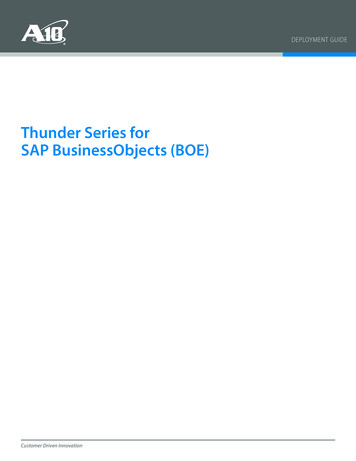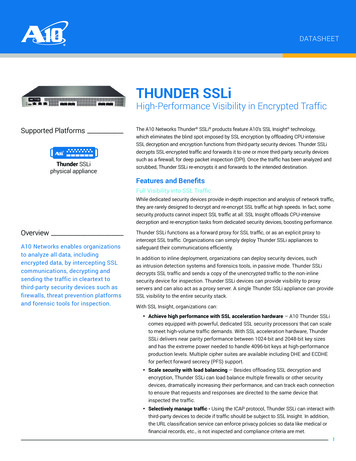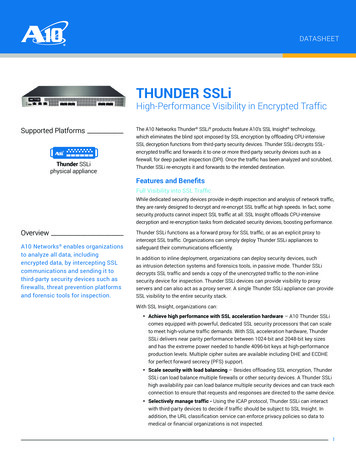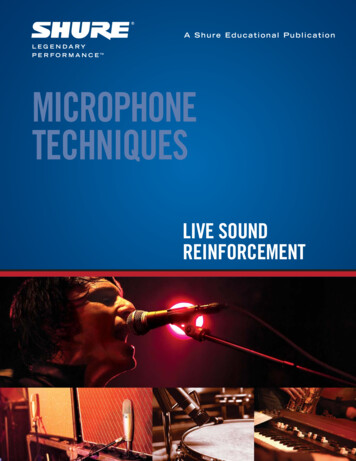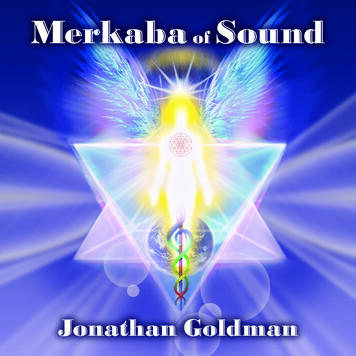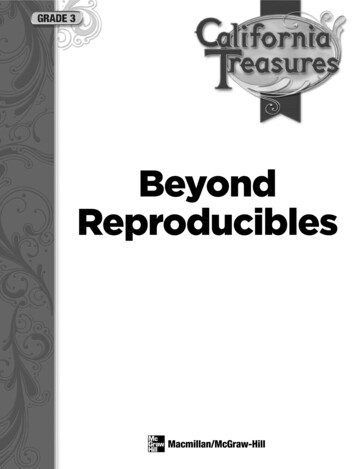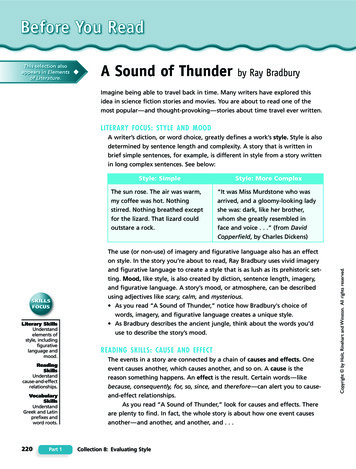
Transcription
A Sound of Thunderby Ray BradburyImagine being able to travel back in time. Many writers have explored thisidea in science fiction stories and movies. You are about to read one of themost popular and thought-provoking stories about time travel ever written.LITERARY FOCUS: STYLE AND MOODA writer’s diction, or word choice, greatly defines a work’s style. Style is alsodetermined by sentence length and complexity. A story that is written inbrief simple sentences, for example, is different in style from a story writtenin long complex sentences. See below:The sun rose. The air was warm,my coffee was hot. Nothingstirred. Nothing breathed exceptfor the lizard. That lizard couldoutstare a rock.Literary SkillsUnderstandelements ofstyle, includingfigurativelanguage ationships.VocabularySkillsUnderstandGreek and Latinprefixes andword roots.220Part 1Style: More Complex“It was Miss Murdstone who wasarrived, and a gloomy-looking ladyshe was: dark, like her brother,whom she greatly resembled inface and voice . . .” (from DavidCopperfield, by Charles Dickens)The use (or non-use) of imagery and figurative language also has an effecton style. In the story you’re about to read, Ray Bradbury uses vivid imageryand figurative language to create a style that is as lush as its prehistoric setting. Mood, like style, is also created by diction, sentence length, imagery,and figurative language. A story’s mood, or atmosphere, can be describedusing adjectives like scary, calm, and mysterious. As you read “A Sound of Thunder,” notice how Bradbury's choice ofwords, imagery, and figurative language creates a unique style. As Bradbury describes the ancient jungle, think about the words you’duse to describe the story’s mood.READING SKILLS: CAUSE AND EFFECTThe events in a story are connected by a chain of causes and effects. Oneevent causes another, which causes another, and so on. A cause is thereason something happens. An effect is the result. Certain words likebecause, consequently, for, so, since, and therefore can alert you to causeand-effect relationships.As you read “A Sound of Thunder,” look for causes and effects. Thereare plenty to find. In fact, the whole story is about how one event causesanother and another, and another, and . . .Collection 8: Evaluating StyleCopyright by Holt, Rinehart and Winston. All rights reserved.Style: Simple
PREVIEW SELECTION VOCABULARYThe following words appear in the story you are about to read. You may wantto become familiar with them before you begin reading.annihilate ( ·n ·l†t ) v.: destroy; wipe out.If we continue to destroy the region's forests, wemay also annihilate the wildlife that lives there.expendable (ek·spen d ·b l) adj.: worth sacrificing to gain an objective.The officers regretted the loss but considered theground troops expendable.depression (d ·presh n) n.: major economicdownturn. (Depression also means “sadness.”)A depression hit the country, resulting in widespread unemployment and homelessness.Copyright by Holt, Rinehart and Winston. All rights reserved.paradox (par ·däks ) n.: something that has orseems to have contradictory qualities.The paradox is that sometimes we are loneliestwhen we are in a crowd of people.delirium (di·lir · m) n.: extreme mental disturbance, often accompanied by hallucinations(seeing things that are not there).In his delirium, he imagined he was seeinggiant insects.resilient (ri·zil y nt) adj.: able to return to itsoriginal shape quickly after being stretched orcompressed; elastic.This resilient fabric springs back to its originalshape no matter how you stretch it.remit (ri·mit ) v.: return payment.The company will remit, or return, full paymentif the consumers are not satisfied.revoke (ri·v k ) v.: cancel; withdraw.They can revoke your club membership if youfail to attend meetings.primeval (pr ·m v l) adj.: primitive; of theearliest times.In the prehistoric world, giant lizards crashedthrough the primeval forest.subliminal (sub·lim ·n l) adj.: below the level ofawareness.Unaware of the movie’s subliminal message tobuy food, the audience flocked to buy snacks.PREFIXES AND WORD ROOTSA prefix is a word part that comes before a word root and affects its meaning.A knowledge of prefixes can help you figure out the meanings of unfamiliarwords. It can also help you use and understand a wider variety of words. Theword remit, for example, contains the prefix re-, which means “back.” It alsocontains the word root mit, which means “send.” When you remit something,you send it back.When you come across an unfamiliar word, look for a prefix or word root yourecognize to help you figure out the word’s meaning.A Sound of Thunder221
A Soundof ThunderPeter Bollinger.Ray BradburyThe sign on the wall seemed to quaver under a film of slidingwarm water. Eckels felt his eyelids blink over his stare, and thePause after you read the sign(lines 4-5). Underline theinformation that seemsunusual. Based on this information, when do you thinkthe story takes place?sign burned in this momentary darkness:YOU NAME THE ANIMAL. WE TAKE YOU THERE. YOU SHOOT IT.A warm phlegm gathered in Eckels’s throat; he swallowed andpushed it down. The muscles around his mouth formed a smile ashe put his hand slowly out upon the air, and in that hand waved acheck for ten thousand dollars to the man behind the desk.Pause at line 16. Why do youthink there is such a stiffpenalty for disobeyinginstructions?“Does this safari guarantee I come back alive?”10“We guarantee nothing,” said the official, “except thedinosaurs.” He turned. “This is Mr. Travis, your Safari Guide inthe Past. He’ll tell you what and where to shoot. If he says noshooting, no shooting. If you disobey instructions, there’s a stiffpenalty of another ten thousand dollars, plus possible government action, on your return.”“A Sound of Thunder” by Ray Bradbury. Copyright 1952 by the Crowell-Collier Publishing Co.; copyrightrenewed 1980 by Ray Bradbury. Reprinted by permission of Don Congdon Associates, Inc.222Part 1Collection 8: Evaluating StyleCopyright by Holt, Rinehart and Winston. All rights reserved.TIME SAFARI, INC. SAFARIS TO ANY YEAR IN THE PAST.
Eckels glanced across the vast office at a mass and tangle,a snaking and humming of wires and steel boxes, at an aurora1that flickered now orange, now silver, now blue. There was20a sound like a gigantic bonfire burning all of Time, all the yearsand all the parchment calendars, all the hours piled high and setRe-read lines 17-35, andunderline examples offigurative language (simile,metaphor, personification).aflame.A touch of the hand and this burning would, on theinstant, beautifully reverse itself. Eckels remembered the wording in the advertisements to the letter. Out of chars and ashes,out of dust and coals, like golden salamanders, the old years, thePause at line 43. Who werethe two candidates for president of the United States?Circle their names. Whichone won the election?green years, might leap; roses sweeten the air, white hair turnIrish-black, wrinkles vanish; all, everything fly back to seed, fleedeath, rush down to their beginnings, suns rise in western skies30and set in glorious easts, moons eat themselves opposite to thecustom, all and everything cupping one in another like Chineseboxes2, rabbits into hats, all and everything returning to thefresh death, the seed death, the green death, to the time beforethe beginning. A touch of a hand might do it, the merest touchof a hand.“Unbelievable.” Eckels breathed, the light of the MachineCopyright by Holt, Rinehart and Winston. All rights reserved.on his thin face. “A real Time Machine.” He shook his head.“Makes you think. If the election had gone badly yesterday, Imight be here now running away from the results. Thank God40Keith won. He’ll make a fine President of the United States.”“Yes,” said the man behind the desk. “We’re lucky. IfDeutscher had gotten in, we’d have the worst kind of dictator-Anti- is a prefix meaning“against.” According to thedescription of Deutscher inlines 43-44, what is he“against”?ship. There’s an anti-everything man for you, a militarist, antiChrist, anti-human, anti-intellectual. People called us up, youknow, joking but not joking. Said if Deutscher became Presidentthey wanted to go live in 1492. Of course it’s not our business toconduct Escapes, but to form Safaris. Anyway, Keith’s Presidentnow. All you got to worry about is—”1.2.aurora (ô·rôr ) n.: Bradbury is comparing the glow coming from thetime machine to an aurora, a colorful display of light that appears atnight in the skies near the North and South Poles.Chinese boxes: set of boxes, each of which fits into the next-largestone.A Sound of Thunder223
“Shooting my dinosaur,” Eckels finished it for him.“A Tyrannosaurus rex. The Tyrant Lizard, the most incredi-50ble monster in history. Sign this release. Anything happens toPause at line 52. What animal is Eckels hunting? Circlethe answer.you, we’re not responsible. Those dinosaurs are hungry.”Eckels flushed angrily. “Trying to scare me!”“Frankly, yes. We don’t want anyone going who’ll panic at thefirst shot. Six Safari leaders were killed last year, and a dozenRe-read lines 54-58. What dothese details suggest aboutTime Safari, Inc.?hunters. We’re here to give you the severest thrill a real hunter everasked for. Traveling you back sixty million years to bag the biggestgame in all of Time. Your personal check’s still there. Tear it up.”Mr. Eckels looked at the check. His fingers twitched.“Good luck,” said the man behind the desk. “Mr. Travis, he’s60all yours.”They moved silently across the room, taking their gunswith them, toward the Machine, toward the silver metal and theroaring light.First a day and then a night and then a day and then a night,then it was day-night-day-night-day. A week, a month, a year, adecade! A.D. 2055. A.D. 2019. 1999! 1957! Gone! The MachineCircle the words in lines76-77 that mean “Eckelssaid.” What does this phrasereveal about Eckels?They put on their oxygen helmets and tested the intercoms.Eckels swayed on the padded seat, his face pale, his jaw stiff.70He felt the trembling in his arms, and he looked down andfound his hands tight on the new rifle. There were four othermen in the Machine. Travis, the Safari Leader; his assistant,Lesperance; and two other hunters, Billings and Kramer. Theysat looking at each other, and the years blazed around them.“Can these guns get a dinosaur cold?” Eckels felt his mouthsaying.“If you hit them right,” said Travis on the helmet radio.“Some dinosaurs have two brains, one in the head, another far80down the spinal column. We stay away from those. That’sstretching luck. Put your first two shots into the eyes, if you can,blind them, and go back into the brain.”224Part 1Collection 8: Evaluating StyleCopyright by Holt, Rinehart and Winston. All rights reserved.roared.
The Machine howled. Time was a film run backward. Sunsfled and ten million moons fled after them. “Think,” said Eckels.“Every hunter that ever lived would envy us today. This makesAfrica seem like Illinois.”The Machine slowed; its scream fell to a murmur. TheMachine stopped.Underline the sentence inlines 103-107 that tells youthe purpose of “the Path.”Why do you think the term iscapitalized?The sun stopped in the sky.The fog that had enveloped the Machine blew away and90they were in an old time, a very old time indeed, three huntersand two Safari Heads with their blue metal guns across theirknees.“Christ isn’t born yet,” said Travis. “Moses has not gone tothe mountain to talk with God. The Pyramids are still in theearth, waiting to be cut out and put up. Remember that.Alexander, Caesar, Napoleon, Hitler—none of them exists.”The men nodded.“That”—Mr. Travis pointed—“is the jungle of sixty mil100lion two thousand and fifty-five years before President Keith.”Re-read lines 111-113, whichare full of imagery. To whatsenses do these imagesappeal?He indicated a metal path that struck off into green wilderness, over streaming swamp, among giant ferns and palms.Copyright by Holt, Rinehart and Winston. All rights reserved.“And that,” he said, “is the Path, laid by Time Safari foryour use. It floats six inches above the earth. Doesn’t touch somuch as one grass blade, flower, or tree. It’s an anti-gravitymetal. Its purpose is to keep you from touching this world of thePast in any way. Stay on the Path. Don’t go off it. I repeat. Don’tgo off. For any reason! If you fall off, there’s a penalty. And don’tshoot any animal we don’t okay.”“Why?” asked Eckels.110They sat in the ancient wilderness. Far birds’ cries blew ona wind, and the smell of tar and an old salt sea, moist grasses,and flowers the color of blood.“We don’t want to change the Future. We don’t belong herein the Past. The government doesn’t like us here. We have to paybig graft3 to keep our franchise. A Time Machine is finicky3.graft n.: bribes.A Sound of Thunder225
business. Not knowing it, we might kill an important animal, aNotessmall bird, a roach, a flower even, thus destroying an importantlink in a growing species.”“That’s not clear,” said Eckels.120“All right,” Travis continued, “say we accidentally kill onemouse here. That means all the future families of this one particular mouse are destroyed, right?”“Right.”“And all the families of the families of the families of thatone mouse! With a stamp of your foot, you annihilate first one,then a dozen, then a thousand, a million, a billion possiblemice!”“So they’re dead,” said Eckels. “So what?”“So what?” Travis snorted quietly. “Well, what about the130foxes that’ll need those mice to survive? For want of ten mice, aannihilate ( ·n ·l†t ) v.:destroy; wipe out.fox dies. For want of ten foxes, a lion starves. For want of a lion,all manner of insects, vultures, infinite billions of life forms areexpendable (ek·spen d ·b l)adj.: worth sacrificing to gainan objective.thrown into chaos and destruction. Eventually it all boils down tothis: Fifty-nine million years later, a cave man, one of a dozen inthe entire world, goes hunting wild boar or saber-toothed tigerregion. By stepping on one single mouse. So the cave man starves.In this long paragraph (lines130-155), Travis explains thepossible effects of steppingoff the path and killing amouse. Each effect, in turn,becomes the cause of another event. What is the finaleffect Travis mentions?And the cave man, please note, is not just any expendable man,140no! He is an entire future nation. From his loins would havesprung ten sons. From their loins one hundred sons, and thusonward to a civilization. Destroy this one man, and you destroy arace, a people, an entire history of life. It is comparable to slayingsome of Adam’s grandchildren. The stomp of your foot, on onemouse, could start an earthquake, the effects of which couldshake our earth and destinies down through Time, to their veryfoundations. With the death of that one cave man, a billion others yet unborn are throttled in the womb. Perhaps Rome neverrises on its seven hills. Perhaps Europe is forever a dark forest,150and only Asia waxes healthy and teeming.4 Step on a mouse and4.226Part 1teeming (t m i«) adj.: swarming; overflowing.Collection 8: Evaluating StyleCopyright by Holt, Rinehart and Winston. All rights reserved.for food. But you, friend, have stepped on all the tigers in that
Peter Bollinger.Notesyou crush the Pyramids. Step on a mouse and you leave yourprint, like a Grand Canyon, across Eternity. Queen Elizabethmight never be born, Washington might not cross the Delaware,there might never be a United States at all. So be careful. Stay onthe Path. Never step off!”“I see,” said Eckels. “Then it wouldn’t pay for us even todepression (d ·pre n) n.:major economic downturn.Copyright by Holt, Rinehart and Winston. All rights reserved.touch the grass?”“Correct. Crushing certain plants could add up infinitesimally.5 A little error here would multiply in sixty million years,160all out of proportion. Of course maybe our theory is wrong.Maybe Time can’t be changed by us. Or maybe it can be changedonly in little subtle ways. A dead mouse here makes an insectimbalance there, a population disproportion later, a bad harvestWhat does Travis mean whenhe says he’s not sure whether“messing around in Time canmake a big roar or a littlerustle in history” (lines169-171)?further on, a depression, mass starvation, and, finally, a changein social temperament in far-flung countries. Something muchmore subtle, like that. Perhaps only a soft breath, a whisper, ahair, pollen on the air, such a slight, slight change that unlessyou looked close you wouldn’t see it. Who knows? Who reallycan say he knows? We don’t know. We’re guessing. But until we170do know for certain whether our messing around in Time canmake a big roar or a little rustle in history, we’re being careful.5.infinitesimally (in fin·i·tes i·m l· ) adv.: in amounts too small to bemeasured.A Sound of Thunder227
This Machine, this Path, your clothing and bodies, were sterilized, as you know, before the journey. We wear these oxygenhelmets so we can’t introduce our bacteria into an ancientPause at line 175. Why dothe travelers wear sterilizedclothing and oxygenhelmets?atmosphere.”“How do we know which animals to shoot?”“They’re marked with red paint,” said Travis. “Today, beforeour journey, we sent Lesperance here back with the Machine. Hecame to this particular era and followed certain animals.”“Studying them?”180“Right,” said Lesperance. “I track them through their entireexistence, noting which of them lives longest. Very few. Howmany times they mate. Not often. Life’s short. When I find onethat’s going to die when a tree falls on him, or one that drownsin a tar pit, I note the exact hour, minute, and second. I shoot apaint bomb. It leaves a red patch on his side. We can’t miss it.Pause at line 190. Why areonly animals that are aboutto die anyway chosen forhunting?Then I correlate our arrival in the Past so that we meet theMonster not more than two minutes before he would have diedanyway. This way, we kill only animals with no future, that are190never going to mate again. You see how careful we are?”“But if you came back this morning in Time,” said Eckelsturn out? Was it successful? Did all of us get through—alive?”Travis and Lesperance gave each other a look.“That’d be a paradox,” said the latter. “Time doesn’t permitRe-read lines 195-202. Whatdo you think? Will the expedition be a success, or will itend in tragedy?that sort of mess—a man meeting himself. When such occasions threaten, Time steps aside. Like an airplane hitting an airpocket. You felt the Machine jump just before we stopped? Thatwas us passing ourselves on the way back to the Future. We saw200nothing. There’s no way of telling if this expedition was a success, if we got our monster, or whether all of us—meaning you,Mr. Eckels—got out alive.”Eckels smiled palely.paradox (par ·däks ) n.:something that has or seemsto have contradictoryqualities.228Part 1Collection 8: Evaluating Style“Cut that,” said Travis sharply. “Everyone on his feet!”They were ready to leave the Machine.Copyright by Holt, Rinehart and Winston. All rights reserved.eagerly, “you must’ve bumped into us, our Safari! How did it
The jungle was high and the jungle was broad and the jungle was the entire world forever and forever. Sounds like musicand sounds like flying tents filled the sky, and those were pterodactyls soaring with cavernous gray wings, gigantic bats of210delirium and night fever. Eckels, balanced on the narrow Path,aimed his rifle playfully.delirium (di·lir · m) n.:extreme mental disturbance,often accompanied by hallucinations (seeing things thatare not there).“Stop that!” said Travis. “Don’t even aim for fun, blast you!If your guns should go off—”Eckels flushed. “Where’s our Tyrannosaurus?”Lesperance checked his wristwatch. “Up ahead. We’ll bisecthis trail in sixty seconds. Look for the red paint! Don’t shoot tillwe give the word. Stay on the Path. Stay on the Path!”They moved forward in the wind of morning.Re-read lines 206-211, andcircle repeated words. Then,underline the imaginativedescription of pterodactyls.How would you describe thestyle of the writing here?“Strange,” murmured Eckels. “Up ahead, sixty million years,220Election Day over. Keith made President. Everyone celebrating.And here we are, a million years lost, and they don’t exist. Thethings we worried about for months, a lifetime, not even bornor thought of yet.”“Safety catches off, everyone!” ordered Travis. “You, firstshot, Eckels. Second, Billings. Third, Kramer.”Copyright by Holt, Rinehart and Winston. All rights reserved.“I’ve hunted tiger, wild boar, buffalo, elephant, but now,this is it,” said Eckels. “I’m shaking like a kid.”Pause at line 217. The guideskeep telling Eckels, “Stay onthe Path!” What do theirwarnings lead you to predict?“Ah,” said Travis.Everyone stopped.230Travis raised his hand. “Ahead,” he whispered. “In the mist.There he is. There’s His Royal Majesty now.”The jungle was wide and full of twitterings, rustlings, murmurs, and sighs.Suddenly it all ceased, as if someone had shut a door.Silence.A sound of thunder.Pause at line 231. Whommight Travis be referring toas “His Royal Majesty”?Out of the mist, one hundred yards away, cameTyrannosaurus rex.“It,” whispered Eckels. “It . . .”240“Sh!”A Sound of Thunder229
It came on great oiled, resilient, striding legs. It toweredthirty feet above half of the trees, a great evil god, folding its delicate watchmaker’s claws close to its oily reptilian chest. Eachresilient (ri·zil y nt) adj.: ableto return to its original shapequickly after being stretchedor compressed; elastic.lower leg was a piston, a thousand pounds of white bone, sunkin thick ropes of muscle, sheathed over in a gleam of pebbledskin like the mail6 of a terrible warrior. Each thigh was a ton ofmeat, ivory, and steel mesh. And from the great breathing cageThe author uses richfigurative language in lines241-259. Underline at leastfour metaphors or similesthat help you visualize thefearsome dinosaur.of the upper body those two delicate arms dangled out front,arms with hands which might pick up and examine men like250toys, while the snake neck coiled. And the head itself, a ton ofsculptured stone, lifted easily upon the sky. Its mouth gaped,exposing a fence of teeth like daggers. Its eyes rolled, ostricheggs, empty of all expression save hunger. It closed its mouth ina death grin. It ran, its pelvic bones crushing aside trees andbushes, its taloned feet clawing damp earth, leaving prints sixRead the boxed passagealoud twice. Focus on reading the figures of speechclearly and dramatically.inches deep wherever it settled its weight. It ran with a glidingballet step, far too poised and balanced for its ten tons. It movedinto a sunlit arena warily, its beautifully reptilian hands feelingthe air.“Why, why,” Eckels twitched his mouth. “It could reach up260and grab the moon.”“Sh!” Travis jerked angrily. “He hasn’t seen us yet.”Notes“It can’t be killed.” Eckels pronounced this verdict quietly,as if there could be no argument. He had weighed the evidenceand this was his considered opinion. The rifle in his handsseemed a cap gun. “We were fools to come. This is impossible.”“Shut up!” hissed Travis.“Nightmare.”“Turn around,” commanded Travis. “Walk quietly to the270Machine. We’ll remit one half your fee.”“I didn’t realize it would be this big,” said Eckels. “I miscalculated, that’s all. And now I want out.”“It sees us!”“There’s the red paint on its chest!”6.230Part 1mail n.: here, flexible metal armor.Collection 8: Evaluating StyleCopyright by Holt, Rinehart and Winston. All rights reserved.remit (ri·mit ) v.: returnpayment.
The Tyrant Lizard raised itself. Its armored flesh glitteredlike a thousand green coins. The coins, crusted with slime,steamed. In the slime, tiny insects wriggled, so that the entirebody seemed to twitch and undulate,7 even while the monsteritself did not move. It exhaled. The stink of raw flesh blew down280How does Eckels react whenhe sees the dinosaur (lines260-287)? What do theguides tell him to do?the wilderness.“Get me out of here,” said Eckels. “It was never like thisbefore. I was always sure I’d come through alive. I had goodguides, good safaris, and safety. This time, I figured wrong. I’vemet my match and admit it. This is too much for me to get holdof.”“Don’t run,” said Lesperance. “Turn around. Hide in theMachine.”“Yes.” Eckels seemed to be numb. He looked at his feet as iftrying to make them move. He gave a grunt of helplessness.“Eckels!”290He took a few steps, blinking, shuffling.“Not that way!”The Monster, at the first motion, lunged forward with aterrible scream. It covered one hundred yards in six seconds.Copyright by Holt, Rinehart and Winston. All rights reserved.The rifles jerked up and blazed fire. A windstorm from thebeast’s mouth engulfed them in the stench of slime and oldPause at line 302. Whatcauses Eckels to step off thepath? What effect might thisaction have?blood. The Monster roared, teeth glittering with sun.Eckels, not looking back, walked blindly to the edge of thePath, his gun limp in his arms, stepped off the Path, and walked,300not knowing it, in the jungle. His feet sank into green moss. Hislegs moved him, and he felt alone and remote from the eventsbehind.The rifles cracked again. Their sound was lost in shriek andlizard thunder. The great level of the reptile’s tail swung up,lashed sideways. Trees exploded in clouds of leaf and branch.The Monster twitched its jeweler’s hands down to fondle at themen, to twist them in half, to crush them like berries, to cramthem into its teeth and its screaming throat. Its boulder-stone7.undulate (un j ·l†t ) v.: move in waves.A Sound of Thunder231
eyes leveled with the men. They saw themselves mirrored. They310fired at the metallic eyelids and the blazing black iris.Like a stone idol, like a mountain avalanche, Tyrannosaurusfell. Thundering, it clutched trees, pulled them with it. Itwrenched and tore the metal Path. The men flung themselvesback and away. The body hit, ten tons of cold flesh and stone.The guns fired. The Monster lashed its armored tail, twitched itssnake jaws, and lay still. A fount of blood spurted from itsthroat. Somewhere inside, a sac of fluids burst. Sickening gushesdrenched the hunters. They stood, red and glistening.The thunder faded.The jungle was silent. After the avalanche, a green peace.320After the nightmare, morning.Peter Bollinger.Billings and Kramer sat on the pathway and threw up.Travis and Lesperance stood with smoking rifles, cursingsteadily.What two things is the dinosaur compared to in line 311?What type of figurative language is each comparison?In the Time Machine, on his face, Eckels lay shivering. Hehad found his way back to the Path, climbed into the Machine.Travis came walking, glanced at Eckels, took cotton gauzefrom a metal box, and returned to the others, who were sitting“Clean up.”330They wiped the blood from their helmets. They began tocurse too. The Monster lay, a hill of solid flesh. Within, youcould hear the sighs and murmurs as the furthest chambers of itdied, the organs malfunctioning, liquids running a final instantCircle the words in lines311-318 that help you visualize the violent death of thegiant dinosaur.from pocket to sac to spleen, everything shutting off, closing upforever. It was like standing by a wrecked locomotive or a steamshovel at quitting time, all valves being released or levered tight.The prefix mal- means “not”or “bad.” What do you thinkmalfunctioning (line 334)means?Bones cracked; the tonnage of its own flesh, off balance, deadweight, snapped the delicate forearms, caught underneath. The340meat settled, quivering.Another cracking sound. Overhead, a gigantic tree branchbroke from its heavy mooring, fell. It crashed upon the deadbeast with finality.232Part 1Collection 8: Evaluating StyleCopyright by Holt, Rinehart and Winston. All rights reserved.on the Path.
“There.” Lesperance checked his watch. “Right on time.That’s the giant tree that was scheduled to fall and kill this animal originally.” He glanced at the two hunters. “You want thetrophy picture?”“What?”“We can’t take a trophy back to the Future. The body has to350Pause at line 355. Why doyou think the two hunters,Billings and Kramer, do notwant to take “trophypictures”?stay right here where it would have died originally, so theinsects, birds, and bacteria can get at it, as they were intended to.Everything in balance. The body stays. But we can take a pictureof you standing near it.”The two men tried to think, but gave up, shaking theirheads.They let themselves be led along the metal Path. They sankwearily into the Machine cushions. They gazed back at theruined Monster, the stagnating mound, where already strangereptilian birds and golden insects were busy at the steaming360armor.A sound on the floor of the Time Machine stiffened them.Eckels sat there, shivering.“I’m sorry,” he said at last.Copyright by Holt, Rinehart and Winston. All rights reserved.“Get up!” cried Travis.Eckels got up.“Go out on that Path alone,” said Travis. He had his riflepointed. “You’re not coming back in the Machine. We’re leavingyou here!”Lesperance seized Travis’s arm. “Wait—”370“Stay out of this!” Travis shook his hand away. “This foolnearly killed us. But it isn’t that so much, no. It’s his shoes! Lookat them! He ran off the Path. That ruins us! We’ll forfeit!Thousands of dollars of insurance! We guarantee no one leavesthe Path. He left it. Oh, the fool! I’ll have to report to the gov-Re-read lines 369-376.Underline what Travis fearsmight happen because Eckelsstepped off the path.ernment. They might revoke our license to travel. Who knowswhat he’s done to Time, to History!”revoke (ri·v k ) v.: cancel;withdraw.A Sound of Thunder233
“Take it easy, all he did was kick up some dirt.”“How do we know?” cried Tr
A Sound of Thunder 221 annihilate ( ·n ·l†t ) v.: destroy; wipe out. If we continue to destroy the region's forests, we may also annihilate the wildlife that lives there. expendable (ek·spen d ·b
